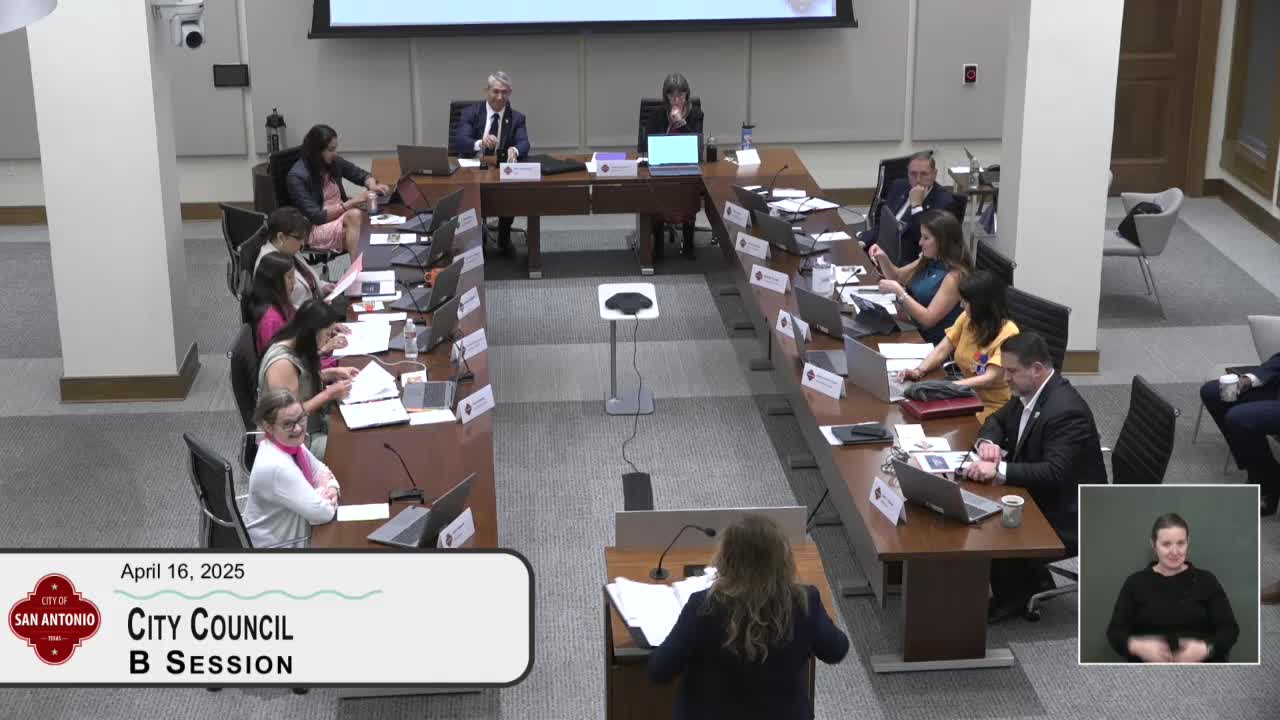San Antonio council receives state legislative update; city signals opposition to bills seen as limiting local control
Get AI-powered insights, summaries, and transcripts
Subscribe
Summary
City staff briefed the council on key measures moving through the 89th Texas Legislature, including bills on evictions, workforce housing, disaster shelters and limits on municipal advocacy. Council members expressed support for a Cyber Command at UTSA and widespread concern about measures they say would erode local authority.
SAN ANTONIO — At a special B session on April 16, 2025, the San Antonio City Council received a monthly briefing on the 89th Texas Legislature and discussed a slate of bills the city is tracking, including measures the council said could reduce local control and change eviction and housing processes.
Sally Basurto, director for government affairs, told the council the regular session had about seven weeks remaining and that committee and floor hearings were active. She reported the House had approved “their version of the budget bill, with a price tag of 337,000,000,000 for the next two years,” and said staff was “vigilant” and coordinating with the city's legislative delegation.
The briefing highlighted several bills the city is following closely. Basurto described HB150 as creating a “Texas cyber command” at the University of Texas at San Antonio; she said the bill had advanced in the House and that city officials, including Mayor Ron Nirenberg and others, had supported the initiative. Councilmember Gregorio White said, “San Antonio is going to be, a great home, for Cyber Command.”
On housing and evictions, Basurto summarized HB32 as a measure to shorten eviction timelines and to loosen delivery requirements for the three-day notice landlords must give tenants before filing for eviction under current state law. City staff said the change could reduce a process that often takes “six to eight weeks or longer” to as little as two weeks in some cases. Basurto noted the city is tracking the bill closely.
Two bills to create state workforce-housing programs were discussed. SB208 would create a workforce housing capital investment program at the Texas Department of Housing and Community Affairs (TDHCA) with authority to authorize a fee to fund the initiative; Basurto said the program would focus on households earning roughly 30–80 percent of area median income and provide 0-percent loans to qualified nonprofit developers. SB234 would provide low-interest “mezzanine” financing for multifamily and rehabilitation projects, with developments reserving units for households earning roughly 50–120 percent of area median income.
Basurto described HB3858 as “very broad and poorly written” as filed; it would, as she summarized, require the governor's office and the Texas Department of Public Safety (DPS) to set up an approval process for cities and counties to build or operate temporary housing or emergency shelters and would allow the governor or DPS to deny such applications after a safety assessment. Basurto said, “We believe this bill would strip the city of its local control and impair the ability for local governments to respond to disasters in a timely manner,” and reported the city opposes the measure and is working with the bill author to seek changes.
Basurto also described HB1866 (as cited in the briefing) to grant additional state-law enforcement authority to National Park Service officers to address criminal mischief at the San Antonio Missions; the city said it supports that bill and had provided written testimony. Separately, a bill listed as HB3594 (reported as HB35,94 by the presenter) that would alter benefits rules for San Antonio police and fire retirees had passed a committee and was referred to the Senate Finance Committee; the city said it supports that measure.
Two measures that drew repeated concern from council members were SB33, introduced by Sen. Campbell, and HB4283 by Rep. LaHood. City staff described SB33 as a proposal to prohibit municipalities from hiring lobbyists to advocate before the Legislature, require registration for certain advocacy, and restrict city membership in associations that work with professional lobbyists; council members characterized the bill as an erosion of local authority and said the city would register opposition consistent with prior council action. On HB4283, Basurto said the bill would authorize the state attorney general to investigate city ordinances and, if violations are found and not corrected, fine municipalities up to $3,000 per day, bar annexation or bond issuance, and allow the comptroller to withhold sales and use tax revenue while a city is in violation. The city said it has concerns and has reached out to the bill author.
Council members also raised questions about proposed education vouchers, which several members said had more than 70 co-sponsors in the Legislature. Mayor Nirenberg asked staff for an update on voucher measures; Basurto said staff understood the governor had the votes to advance the bill and that she and the government affairs team would provide a fuller summary later the same day or the next day. Several council members urged staff to detail how any voucher program would treat students with disabilities and special-education needs.
Council discussion reflected a split on some bills. Councilmember Cabello Haverda said the council had formally opposed SB33; Councilmember White said he disagreed with those objections and supported SB33’s intent to limit certain municipal expenditures. Several members, including Councilmembers Villagran and Castillo, urged the city to continue monitoring and opposing bills they said would curtail local authority or hamper disaster response.
The city plans to continue registering positions with the Legislature consistent with council direction and to follow up with additional briefings for council offices as bills move through committees.
(Ending) The meeting adjourned at 3:08 p.m. after roughly one hour of presentation and council discussion; staff said they would return with additional details and analyses as legislative deadlines approach.
